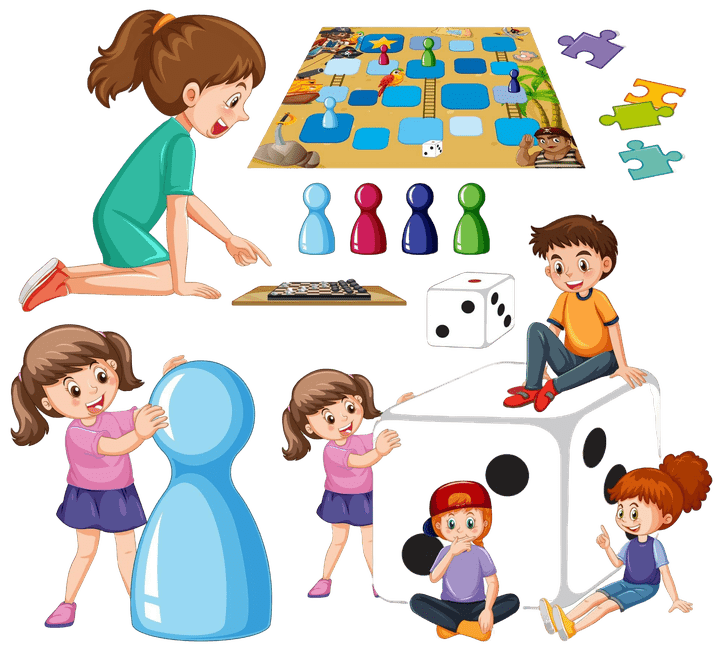



Educational Board Games for Kids: Combining Fun and Learning

Discover how educational board games can make learning enjoyable for kids. Explore the benefits of popular games that develop social, cognitive, and problem-solving skills while providing family bonding time. When it comes to making learning fun, few things are as effective as educational board games for kids. These games are not just entertaining, but they also help in the development of essential skills. If you’re looking for ways to combine playtime with learning, board games for kids are a




The Magic of Board Games for Kids
Board games for kids are more than just a way to pass the time. They offer a range of benefits that can aid in your child's development. Whether it’s improving problem-solving skills, enhancing social interactions, or learning new concepts, these games provide an engaging way to learn.
One of the key advantages of board games is their ability to teach kids about strategy and critical thinking. For example, games that require planning and decision-making can help children understand the consequences of their actions. This can translate into better decision-making skills in real life.
How Educational Board Games Enhance Learning
Educational board games are designed to combine fun with learning. These games often incorporate elements of math, reading, or science into their structure. For instance, a game might involve solving math problems to progress or using vocabulary skills to advance in the game. This approach ensures that children are learning while they are having fun.
Moreover, educational board games can help kids develop cognitive skills. Games that require memory, concentration, and problem-solving can boost these abilities in a playful setting. For example, a memory game that involves matching pairs can enhance a child’s recall skills and attention to detail.
The Benefits of Playing Board Games for Kids
Playing board games for kids offers several advantages. Here are a few reasons why integrating these games into your child’s routine is a good idea:
Social Skills Development: Board games often require players to interact with each other. This can help children learn important social skills such as taking turns, sharing, and communicating effectively. These are crucial skills that will benefit them throughout their lives.
Family Bonding: Playing board games together can be a great way for families to spend quality time. It creates an opportunity for parents and children to connect and have fun together, fostering stronger family relationships.
Stress Relief: Games can be a great way for kids to unwind after a long day. The engaging nature of board games provides a distraction from everyday stress and helps children relax.
Encourages Problem Solving: Many educational board games require kids to solve problems or make strategic decisions. This encourages them to think critically and develop problem-solving skills.
Choosing the Right Educational Board Games
When selecting educational board games for kids, it’s important to choose ones that are age-appropriate and aligned with your child’s interests. Here are some tips to help you pick the right games:
Consider the Age: Board games come with recommended age ranges. Ensure that the game is suitable for your child’s age group to make sure it’s engaging and not too challenging.
Check for Educational Value: Look for games that incorporate learning in a fun way. For example, games that involve counting, reading, or strategy can offer educational benefits.
Read Reviews: Before purchasing a game, check reviews to see what other parents and educators have said about it. This can give you insights into how effective and enjoyable the game is.
Balance Fun and Learning: While it’s important for the game to be educational, it should also be fun. If a game is too focused on learning and not enjoyable, your child might lose interest quickly.
Popular Educational Board Games for Kids
Here are some popular educational board games that can provide both fun and learning:
Scrabble Junior: This game helps kids develop their vocabulary and spelling skills. It’s a great way to introduce them to new words and improve their language skills.
Monopoly Junior: A simplified version of the classic Monopoly game, this version helps kids learn basic math skills and money management in a fun and engaging way.
The Game of Life Junior: This game teaches kids about making decisions and managing resources as they navigate through various life scenarios.
Zingo: This game is perfect for younger children. It helps with language development and recognition of words and pictures.
Incorporating Board Games into Your Routine
Integrating board games into your child’s daily routine can be both fun and beneficial. You can set aside specific times during the week for board game nights or include them as a reward for completing tasks or homework. This not only makes learning enjoyable but also creates positive associations with educational activities.
In conclusion, educational board games for kids are a wonderful way to combine learning with fun. By choosing the right games and incorporating them into your child’s routine, you can help them develop valuable skills while ensuring they have a great time. So, the next time you’re looking for a way to engage your child in learning, consider the many benefits of board games for kids. They’re a win-win for both fun and education!
FAQs
1. What are educational board games for kids?
Educational board games for kids are games specifically designed to teach children important concepts and skills while they play. These games combine fun and learning by incorporating elements such as math, reading, or problem-solving into their gameplay. For example, some educational board games might involve solving math problems or using vocabulary skills to progress in the game.
2. How do board games for kids benefit their development?
Board games for kids offer a range of developmental benefits. They help improve social skills, such as taking turns and communicating effectively, while also encouraging problem-solving and strategic thinking. Additionally, many educational board games enhance cognitive skills like memory and concentration, making them a valuable tool for both learning and fun.
3. Can educational board games replace traditional learning methods?
While educational board games are a great supplement to traditional learning methods, they are not a complete replacement. These games can enhance learning by making it more engaging and interactive, but they should be used alongside other educational activities and resources. They provide a fun way to reinforce concepts learned in school and develop additional skills.
4. How do I choose the right educational board games for my child?
When selecting educational board games for kids, consider your child’s age, interests, and the educational value of the game. Choose games that are age-appropriate and align with your child’s learning needs. Look for games that incorporate fun elements while teaching skills such as math, reading, or problem-solving.
5. Where can I find educational board games for kids?
You can find educational board games for kids at various places, including toy stores, educational supply stores, and online retailers. Websites like Amazon, Walmart, and specialized educational game shops offer a wide selection of board games that cater to different age groups and learning objectives. Additionally, many local bookstores and toy stores carry a variety of educational board games.
